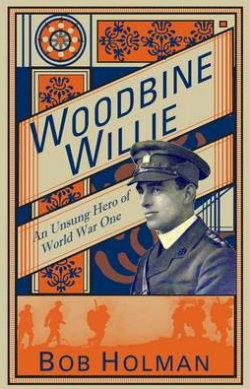Woodbine Willie - forgotten, but relevant
The commemoration of the centenary of the First World War will focus on military battles and rightly honour the many who were killed. But, writes Bob Holman, it is also timely to remember the almost forgotten chaplain who became known for giving Woodbine cigarettes along with spiritual aid to soldiers.
Studdert Kennedy was born in 1883, and served as a priest in a poor parish in Worcester. When war was declared against Germany, he encouraged parishioners to join the army and himself enlisted as a chaplain. In Christmas 1915, in freezing cold weather, he was stationed at a railway junction in France where he held communion, prayed with young soldiers, and, as they left on the trains, gave them New Testaments and fags - after which he became known as Woodbine Willie.

Soon he was in the front line at the Somme where in one day 21,000 British troops were killed. In June, 1917, in Ypres, he was helping in a first aid post which ran out of morphine. Woodbine Willie volunteered to get supplies from another post. He ran through bullets, throwing himself in shell holes for cover, and succeeded in bring back the morphine for men screaming in agony. He was awarded the military cross.
From war to peace
The military cross for bravery made him famous in the army and at home. None the less, he had the honesty to change his mind about the war. He realised that the slaughter of British and German troops was unnecessary and futile. He wrote home to his wife that he wished his sons “to be bitter rebels against the cruelty and folly of war.” On leaving the forces in 1919, he became a campaigner for peace. His books of rhymes sold widely. One is called Waste.
Waste of Muscle, waste of Brain,
Waste of Patience, waste of Pain,
Waste of Manhood, waste of Health,
Waste of Beauty, waste of Wealth,
Waste of Blood, waste of Tears,
Waste of Youth’s most precious years,
Waste of ways the Saints have trod,
Waste of Glory, waste of God,------War!
Against poverty
Woodbine Willie never attended public school or Oxbridge so was unlikely to be made a bishop. He may have lacked privilege but he did possess the ability to converse with ordinary soldiers. Their objectives were a post-war Britain without poverty and unemployment. They never came. He declared, “I believe that hungry children make God mad,” and he preached all over Britain calling for a socially-just society.
His death
At the height of his endeavours, he died suddenly in 1929 at the age of 45. He was refused a burial at Westminster Abbey but his funeral at Worcester had working class people pack the streets while ex-soldiers—many of them unemployed—threw Woodbines into his grave.
Personal practice
Woodbine Willie had little time for politicians and regarded the church as the mouthpiece for combating poverty. I believe that, in the long run, poverty can only be abolished by political decisions. None the less, the church today should share his readiness to proclaim that by Christian teaching it is wrong for some to be wealthy while others are in near destitution.
What is not in question is that Woodbine Willie put his principles into personal practice. He chose his first church on the basis of the lowest stipend. He frequently gave his clothes and goods to the poor. His many books brought him huge royalties, all of which he gave away.
Individuals can point the way to a better society - and there is much to learn from the example of Woodbine Willie.
Bob Holman is the author of Woodbine Willie. An Unsung Hero of World War One, and a member of Easterhouse Baptist Church, Glasgow
Baptist Times, 07/08/2014